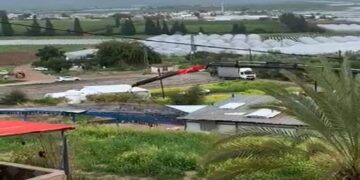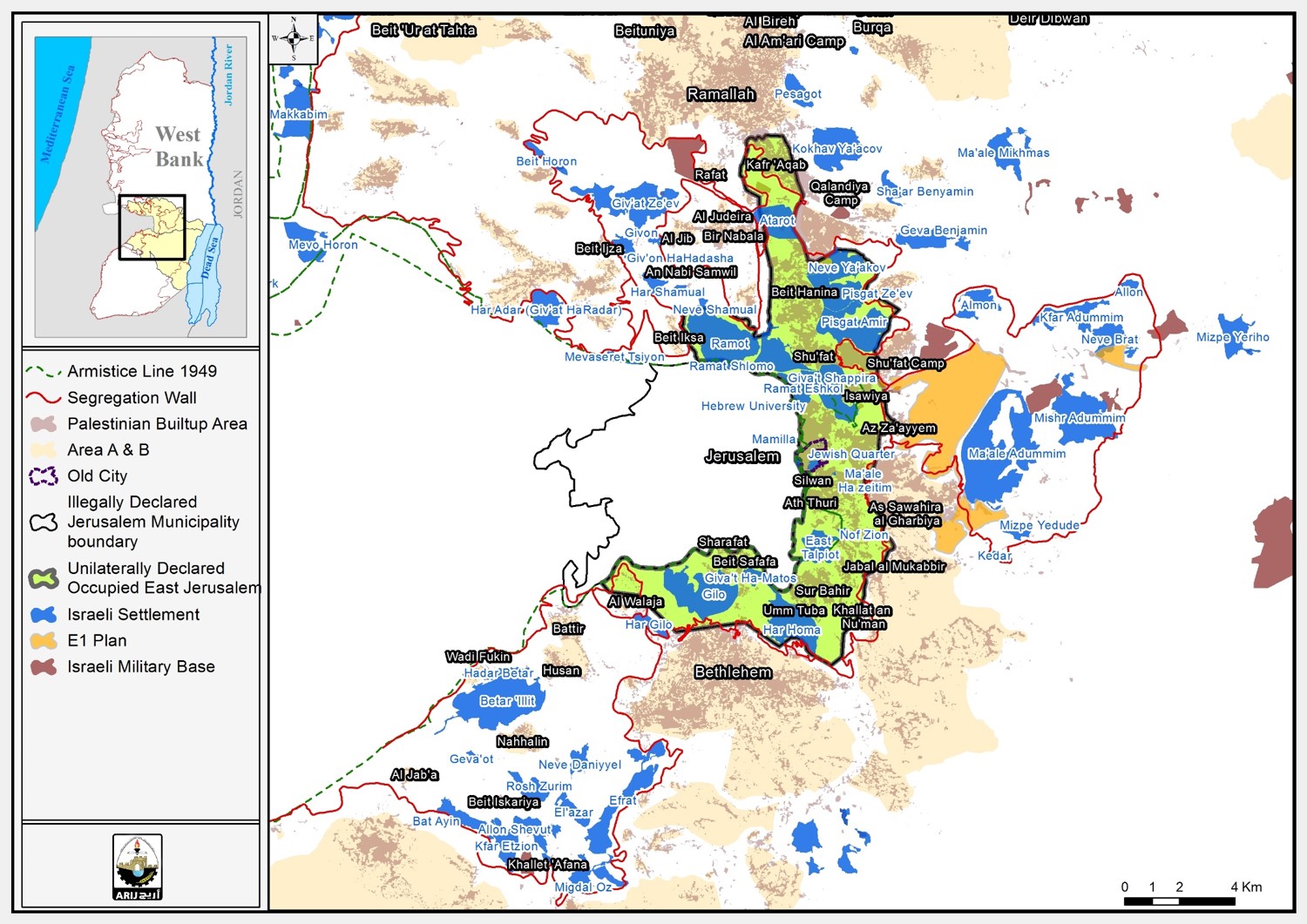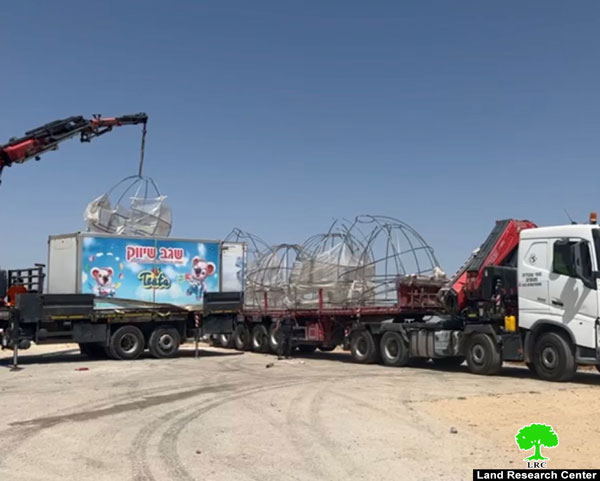Introduction
The Palestinian village of Al Aqaba is located within the Tubas governorate in the north-east of the West Bank and has a population of 300 residents covering an area of 2600 dunums. The village is located in Area C, which is under full Israeli administrative and security control according to Oslo II agreements of 1995, and is bordered by the Israeli military base of Kopra. As a result, Al Aqaba has bared witness to the extensive array of methods employed by the Israeli occupation to displace, oppress and control the Palestinian population, a process which occurs throughout Palestine. Since the 1967 Israeli occupation of the West Bank and the Gaza Strip, Al Aqaba has been denied the right to develop basic infrastructure which would provide services to village residents. The village has suffered from house demolitions, forced displacement, denial of basic services such as water, and the inability to develop naturally as a result of being denied planning and building permission by Israel Occupation Authorities. Al Aqaba village currently faces 39 military orders for the demolition of property, both for residential homes and public institutions such as schools. The survival of Al Aqaba village is greatly threatened by Israeli occupation strategies. The destruction of personal property and modifications to the geographical and demographic characteristics of Palestinian communities is illegal under international law. Israel continues, however, to act unilaterally without any significant or meaningful opposition from the international community.
The effect of Israeli Occupation on the demographic and physical characteristics of Al Aqaba
Although ‘security’ is cited as the major impetus behind imposed restrictions on Al Aqaba village, the Israeli occupation authorities is driven by policy which seeks to annex land. This has been the case since 1948, and most notably since the 1967 occupation. Since 1967 Israel has confiscated 2000 dunums of land from Al Aqaba village and the land on which the village lies has been declared as closed military zone in 1967 where no Palestinian construction or land utilization is allowed. This declaration forced many to flee, creating new refugees who sought residence elsewhere. This unilateral Israeli declaration has also granted unlimited scope for further policies which will destroy Al Aqaba village for the justification of ‘security’. To the east and south of the village lie the military bases of Kopra and Tsephah. The geography of Al Aqaba and surrounding areas has been deemed suitable for military training exercises. As a result, constant training drills take place involving fighter jets and soldiers, with Israeli occupation forces often training in the village and in between houses. This brings Israeli soldiers into close contact with village residents and 8 villagers have been killed since 1971 with more than 50 suffering from serious injuries.
The military presence in the area, and subsequent policies, has served to displace the population. In 1971 there were 1000 residents in the village whereas today there are only 300. In 1999, Israeli occupation forces demolished 7 houses and destroyed much of the electricity and agricultural infrastructure. In 2007, the Israeli occupation authorities issued a military order to re-define the borders of the village, resulting in a proposed loss of 80% of village lands and the destruction of all property that fell outside the Israeli proposed borders. The proposed changes to the village boundaries are part of Israeli master plans which seek to redefine the future status of Palestine. In 2007, 6 residents were issued with military orders to demolish their homes. During the years 2003 and 2006, the Israeli occupation army also issued 29 demolition orders for supposedly ‘illegal’ structures built without permits, permits which Israel has denied residents since 1967. Amongst the structures intended for demolition were a mosque, a kindergarten built by donors from the international community, an electric generator, a newly built road used by residents to access the West Bank and 22 houses. See Map of Al ‘Aqaba Village

Over 80% of the residents of Al Aqaba work in the agricultural sector meaning that the confiscation of land, restrictions in access to water, restrictions in access to land and the uprooting of trees and shrubs by the Israeli military, severely damage the livelihoods and thus sustenance of Al Aqaba residents. Al Aqaba has not been connected to the water network and water infrastructure, which is vital, is lacking. Residents in Al Aqaba are forced to buy water from the Israeli water company Mekorot at extortionate prices, paying 15 shekels per cubic meter.
Resisting through peaceful means
The village council of Al Aqaba, together with individual residents, has filed objections to the Israeli military orders for demolitions. Petitions and advocacy campaigns have also been launched in coordination with Israeli peace organizations and international actors in order to peacefully and legally challenge Israeli occupation. In this way Al Aqaba village is trying to use the Israeli system to defend its rights. 35 of the 45 structures in Al Aqaba have been issued demolition orders which would, if carried out, effectively destroy the town and displace the entire population. In April 2008, the Israeli high court of justice rejected the petitions to stop demolition orders in the village. This means in effect that although not yet demolished, the village could be destroyed at any time with no warning, leaving the population vulnerable and susceptible to mass forced displacement.
Peaceful and legal resistance to Israeli occupation has been led by Al Aqaba mayor Haj Sami, a well respected and dedicated leader who has sought to develop the village by building infrastructure and improving the sustainability of village life. Haj Sami also brought a successful case to the Israeli High Court concerning the constant military drills and raids in the village. Injured and paralyzed by Israeli gunfire, Haj Sami, together with the village council and the residents, has sought to resist displacement by campaigning for the rights of village residents. Future plans include the construction of a Peace Center where international supporters can gather, learn and share information on the process of peacefully campaigning for the overdue rights of the Palestinian people.
It is important to note that all Israeli measures taken in Al Aqaba are illegal under international law, and are intended to displace the Palestinian population in an attempt to gain control over land in the Jordan Valley. Israel has no legitimate claim over the Jordan Valley but justifies its colonialism through citing ‘security’ needs. Settlers in the Jordan Valley number around +13,000 and are often agricultural settlers, producing products that are sold abroad and marketed as ‘made in Israel’ although they are actually made and exported illegally from stolen land occupied by Jews from around the world.
Israeli measures in Al Aqaba village, as in the West Bank, Gaza and the Golan Heights more generally, violate international law and the Geneva Conventions:
-
Article 53 reads: “Any destruction by the Occupying Power of real or personal property belonging individually or collectively to private persons…is prohibited.’
-
Article 49 of the 4th Geneva Convention reads: ‘The Occupying Power shall not transfer parts of its own civilian population into territories it occupies’
Israel violates international law, and common ethics, quite consciously and is fully aware of the suffering it inflicts on the lives of Palestinians on a micro level. This is however a mere inconvenience to the macro level and geo-political aims of the Israeli state, which are to prevent the creation of a viable Palestinian state and annex as much land and resources as possible to Israel. Ariel Sharon, the late Israeli prime minister of Israel has openly stated this claim;
‘You don’t simply bundle people onto trucks and drive them away….I prefer to advocate a positive policy, to create, in effect, a condition that in a positive way will induce people to leave.’ Ariel Sharon, quoted by David Bernstein in Forcible Removal of Arabs gaining support in Israel‘, The (London) Times, August 24, 1988, page 7. Cited in .’ Ariel Sharon, quoted by David Bernstein in ‘, The (London) Times, August 24, 1988, page 7. Cited in
Imperial Israel and the Palestinians: the Politics of Expansion, by Nur Masalha; Chapter 2, footnote 117., by Nur Masalha; Chapter 2, footnote 117.
Prepared by













